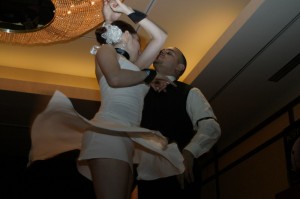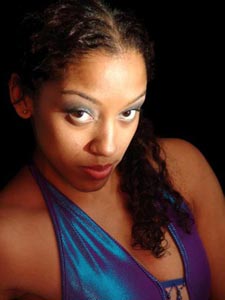Burju Hurturk
An Interview with Burju Hurturk – Boston
 JJ: First and foremost, thank you for giving La Voz Del Mambo an opportunity to interview you. Hacha Y Machete is officially my favorite group 🙂 Your routine at the North Carolina Congress was breath-taking! You guys are truly a “professional” group. I’m curious to know how much work goes it your routines. How often do you guys practice?
JJ: First and foremost, thank you for giving La Voz Del Mambo an opportunity to interview you. Hacha Y Machete is officially my favorite group 🙂 Your routine at the North Carolina Congress was breath-taking! You guys are truly a “professional” group. I’m curious to know how much work goes it your routines. How often do you guys practice?
BH: You are too sweet! Thank you for your kind words. I can’t even begin to describe the joy it brings us to know that people are moved by our choreographies. It’s interesting that you would ask about how much work goes into our routines because it truly is a painstaking process, kind of like giving birth (not that I know what that feels like yet).
The first step is finding the song. I never like to set criteria like fast, classy, jazzy, and funky. I just want to go into it with an open mind because you never know what’s really out there when it comes to music. My only criteria are that it has to give me a lump in my throat when I hear it. The kind of lump you get when you are so emotional you are about to cry. That’s what needs to happen to me for me to say “that’s the next Hacha song”.
Those emotions I feel are what inspire the choreography for the routine. I will never cut and paste pieces of different songs together because I feel that each song tells a story – not just in it’s lyrics but in the composition itself. That’s the beauty of all songs; they build up to a climax; they take you on an emotional journey. I like to materialize those stories into dance steps and turn patterns so that our bodies tell the story along with the instruments.
Once the song is picked I go through a period of about a month or even longer where I listen to the song non stop. I’m talking about while I work, in the car, fall asleep to it, and wake up to it. I listen to the point that I’ve memorized every beat and break, and I know each individual instruments parts. Then the choreography can begin.
The music dictates where the choreography will go, I’m just materializing it. Some songs take longer than others and sometimes I’ll get stuck on one part for a while. I don’t like to settle when it comes to songs and choreography. As far as practices go, we work two days a week and we add 1 to 2 more days when we are getting ready for something big like the debut of a new routine or a big congress. Victor and I sneak in extra practices also since we’re engaged and live together, that’s always a plus.
JJ: Your style of dancing is very unique and full of flava. Is there any hip-hop influence in your dancing? Where did your style come from? What other forms of dancing do you enjoy?
BH: Thank you again. You definitely called it with the hip hop. Before all this salsa madness swept me off my feet I danced with several hip hop companies in high school and college. I love the sharpness, creativity, and raw flava of hip hop.
I also used to be a rhythmic gymnast and have done things like ballet and jazz. When it came to salsa it took me a while to figure out what my “style” was. I was too busy trying to figure out how to follow a guy let alone look good doing it.
My best friend Jennifer from high school taught me my first salsa steps. Back then we just shook a lot and threw in a lot of kicks while we did our basic. Then one day the concept of on2 and freestyle was introduced to me and I’m like ok this is something I can get into. I learned Suzy Qs and crossovers but found myself doing it like everyone else.
So I started to work on differentiating myself and really feeling it. I forced myself not to regurgitate patterns I learned in classes. Instead I really started listening to the music and going with my natural feeling, kind of the way I did when I danced hip hop.
I used to put on some music stand in front of a mirror and just dance my heart out. I would also tape myself so I could later see what I didn’t like and would not be doing again. I also corrected things like posture and technique that way. I still try to do this every so often.
JJ: I understand that Boston has a great salsa scene. Where would you rate Boston in comparison to salsa scenes in other cities?
BH: I understand that Boston has a great salsa scene. Where would you rate Boston in comparison to salsascenes in other cities? Boston does have a great scene but it’s hard to rate in comparison to other cities.
One reason is because I haven’t been around to that many to really make a comparison. When it comes to quantity we have definitely grown in the last couple of years. With the success of some of our local groups in congresses in other cities, it has put Boston on the salsa/mambo map.
What’s even more important than quantity in a salsa scene is the quality, and what I mean by quality is in the love and respect that dancers share for each other. I take a lot of pride in Boston when it comes to this because we have really worked hard to break the divide between the different dance companies, the On1 and On2 crowds, the beginners and the advanced.
There is a lot of love in our dance community. We support each others’ events; we try to do collaborations with each other. We make beginners feel welcome when they enter a class or a social.
By all means I’m not trying to make us sound perfect because we have our share of drama. But for the most part the majority of the dancers are trying to get past any drama and work towards a united dance community. We will all benefit more from working together and promoting together than if we are always trying to get ahead of the next guy.
JJ: I understand that you and Victor are apart of “The Fogarate Dance Project” with Juan Matos. How would you describe your experience of working with Juan?
BH: Juan is our mentor and our inspiration. Not to mention a great friend. He is so creative and talented we are truly blessed to work with him. He is a lot of fun to work with but you better be able to keep up. He is forever making changes to choreographies and going above and beyond to make things unique.
That’s what we love about him. He keeps us on our toes and we never know what to expect. I love learning from him and being a student again. It challenges and inspires me. Working in the Fogarate Dance Project is an experience like none other. You would think that the fact that it is a “project” it can’t be something people are committed to. But we are.
The energy at our rehearsals is incredible. Every one is sweating and working their tails off. And the best part is working with other dancers of such high caliber. It’s tough on Victor and I sometimes because we have to drive from Boston (4 hours) to practice in New York for three hours and drive back (another 4 hours) all in one day. But it’s worth it if you ask me.
JJ: You guys travel a lot for dancing. Where is your favorite place overseas for salsa dancing?
 BH: So far I would have to say Turkey and that’s because it’s where I’m from. My entire family still lives there except for my father (who is in New York) so it’s just great to go there and see them and get to dance for them. Plus it’s kind of cool seeing Turkish people enjoy something I’ve come to love so much. The scene is still in its beginning stages and there are only a handful of people that know about or dance On2. But we all had to start somewhere.
BH: So far I would have to say Turkey and that’s because it’s where I’m from. My entire family still lives there except for my father (who is in New York) so it’s just great to go there and see them and get to dance for them. Plus it’s kind of cool seeing Turkish people enjoy something I’ve come to love so much. The scene is still in its beginning stages and there are only a handful of people that know about or dance On2. But we all had to start somewhere.
Italy is a close second. They love to dance out there and there are some amazing On2 or on clave dancers. Their Rueda takes the cake though. I’ve never seen so many people participate in a Rueda circle in a night club before.
Also, I hope I will be asked this question again when I’ve had the opportunity to travel a little more. Some places I’m dying to go are Australia and Japan. After seeing and meeting some of the groups and dancers from those countries I would love to check out their dance scenes and share more dances with them.
JJ: You are a legitimate salsa superstar. I apologize because I know you hate when I refer to you as such, but that’s the repercussion of having such tremendous talent. What keeps you humble and approachable? What advice would you offer to individuals who are in the process of becoming salsa stars?
BH: I appreciate you even think of me in that way but I guess the reason I don’t like the term “superstar or being classified as one is because I don’t feel it really fits me. I still feel like I have so far to go and so much more to discover about myself and about my dancing. Despite what people think, I’m actually a bit insecure about my dancing and tend to be very hard on myself.
Being hard on myself is not a bad thing because that’s what pushes me to keep working and improving. But the insecure part is something that I’ve been working on for some time. The dancing has definitely helped me work on it, but there’s still a ways to go.
Besides that I just have always seen myself as a student rather than the “superstar”, and I prefer it that way. I feel so much more satisfaction from continuously learning, growing, and transforming than I do from being recognized for what I’ve achieved. Don’t get me wrong, I’m proud of how far this little Turkish girl has gotten in this trade but I’m not done yet.
And if I had to choose between being a student or a teacher, I would choose the prior. Thank god I don’t have to choose because I love teaching and sharing with people the things I’ve learned and hopefully they will also achieve that same transformation in their dancing and themselves.
As for advice for individuals in the process of becoming salsa stars, continue being a student. That’s the most important thing. We owe that to our students and our craft to continue growing and improving ourselves. The minute you stop being a student you are failing them and yourself. Even if you feel you have learned everything about salsa you think you need to know take a hip hop, belly dancing, tap, martial arts, ballet, or any other class that you never had any experience in before. Go back to being a beginner at something new, and if that isn’t a humbling experience I don’t know what is.
JJ: What is the most interesting thing about you, outside of Salsa?
BH: Tough question…not really sure what the most interesting thing about me is. I guess that I’m always down for anything. I like to try any new physical activity, any type of crafts, travel anywhere around the world, eat any kind of food…etc. The only thing I’m not down for is anything that will scare the crap out of me.
I startle easy and things freak me out. For example, don’t ask me to go down to my basement at night with the lights off cuz I won’t do it, no way. And you better believe I need to have all lights turned on before I go to another room if I’ve just watched a scary movie.
Victor (my fiance and dance partner) loves to torment me. He’ll run into the house late at night when we are just coming home from somewhere and hide with the lights off just to jump out at me, and other mean things like that. That’s ok, I’m still crazy about my Sookie!
JJ: What made you give La Voz del Mambo an opportunity to interview you during the initial phases, when it was just an idea?
BH: Well, I loved the idea and believed in it. It was an honor to even be asked. I feel really fortunate to have been able to share a bit of myself with others. You never know who will read and relate to some of your experiences or possibly be inspired by what you have said.
A couple of people have already approached me and commented on the first interview we did, particularly on the part when I went on about my whole choreography process. Most couldn’t believe that I actually went through so much for one choreography. But I’m not ashamed to admit that I struggle through it each time I do a new number. Hey, nothing good comes easy, at least not for me.
JJ: Any additional comments you would like to share?
BH: Just a general statement: never stop being a student. The ability to learn and grow as dancers and as people is our greatest gift. Then share your gift and your love for this music and dance with others, and show them what a positive and beautiful thing it really is. May your feet never get tired…keep dancin’!
Burju Hurturk
burju@hymstyle.com
http://www.hymstyle.com/


Leave a comment